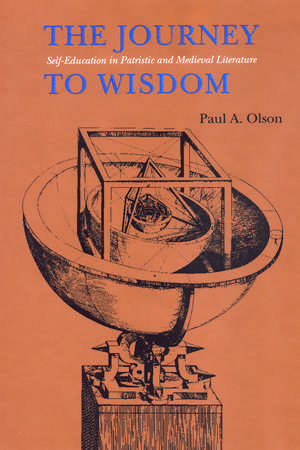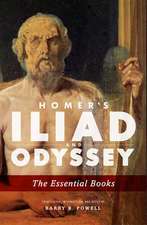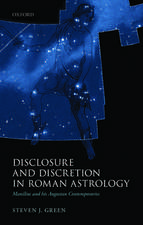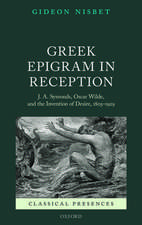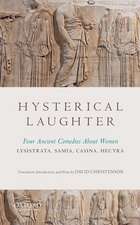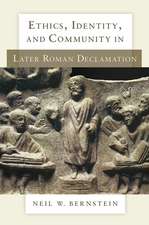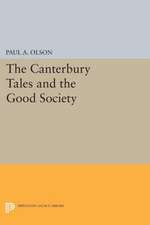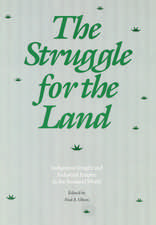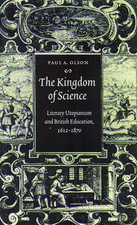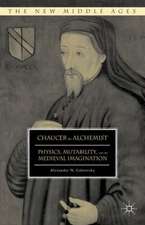The Journey to Wisdom: Self-Education in Patristic and Medieval Literature
Autor Paul A. Olsonen Limba Engleză Hardback – 30 sep 1995
The Journey to Wisdom addresses a broad array of topics in education, the natural world, and medieval intellectual history. The book examines a philosophy of education that originated with the ancient Greeks and that reached its culmination in the late-medieval and early-Renaissance periods. That philosophy of education promotes a journey to wisdom, involving an escape from pure subjectivity and “the seductions of rhetoric” and leading to a profound awareness of the natural world and “nature’s God.” It grants us a renewed sense of education as a self-directed, transforming journey to knowledge and insight—rather than (as is so often the case now) as an impersonal, bureaucratized trek that reflects little sense of the ultimate aims of education.
The volume opens with a discussion of the quarrel in ancient Greece between the Sophists and the so-called “philosophers”—a quarrel, Paul A. Olson writes, “out of which the [philosophers’] tradition centering education in reality, as opposed to social convention, develops.” Subsequent chapters follow the development of this tradition in the writings of Augustine, Boethius, Dante, Petrarch, Copernicus, Galileo, Kepler, and others. Here Olson refutes several recent theories: that medieval intellectuals helped legitimize technological mastery and exploitation of the environment; that medieval education involved no systematic progress “toward recognizing the sanctity of creation”; and that all literary works—medieval ones included—“are self-referenced,” and therefore that they offer no guidance to a world beyond themselves.
The Journey to Wisdom will be essential reading for students of ancient, medieval, and Renaissance intellectual history. But in its unmistakably modern concerns about education, the book also speaks to a far wider spectrum of readers. Olson’s study falls into that rarest category of scholarly productions: one that reflects both its author’s profound knowledge of the past and his equally great commitment to the present. That dual commitment accounts for the uncommon insights—and pleasures—offered by this book.
Preț: 398.59 lei
Nou
Puncte Express: 598
Preț estimativ în valută:
76.28€ • 79.54$ • 63.40£
76.28€ • 79.54$ • 63.40£
Carte tipărită la comandă
Livrare economică 20 martie-03 aprilie
Preluare comenzi: 021 569.72.76
Specificații
ISBN-13: 9780803235625
ISBN-10: 0803235623
Pagini: 299
Dimensiuni: 152 x 229 x 26 mm
Greutate: 0.66 kg
Ediția:New.
Editura: Nebraska
Colecția University of Nebraska Press
Locul publicării:United States
ISBN-10: 0803235623
Pagini: 299
Dimensiuni: 152 x 229 x 26 mm
Greutate: 0.66 kg
Ediția:New.
Editura: Nebraska
Colecția University of Nebraska Press
Locul publicării:United States
Notă biografică
Paul A. Olson is Foundation Professor of English at the University of Nebraska-Lincoln. He is the author of The Canterbury Tales and the Good Society and the editor of The Struggle for the Land: Indigenous Insight and the Industrial Empire in the Semiarid World (Nebraska 1990). Mr. Olson has spent much of his career from the 1960s to the 1990s working on reform in education, especially in inner cities, Indian reservations and rural areas afflicted by the farm crisis. He is past president of the Center for Rural Affairs, a sustainable agriculture and farm advocacy group.
Recenzii
"In an era when people speak constantly of the reform of teaching, when old-fashioned principles of education are often called into question, a reading of this book is very useful. The author, a professor of English who has been involved in battles for education reform in the United States for many years, invites us on this journey toward wisdom from the time of the Greeks to the Renaissance. . . . The reading of this beautiful book, written more by a philosopher than a historian, is helped by extremely learned notes and an excellent index."—Pierre Riché, Cahiers de Civilisation Médiévale
"This study presents a visionary argument about "the journey to wisdom" that commences with Plato and ends with Kepler: it is learned, wide-ranging, lucid, and inspirational, and it is the kind of big book intellectually . . . that forces us to think about what we are teaching and why and about the history of that what and why. Olson is an accomplished medievalist. . . . [whose] scholarly, pedagogical and ecological passions inform this remarkable study."—Michael J. B. Allen, Renaissance Quarterly
"This is an important, complex, and wide ranging interpretation of significant aspects of Western educational theory and practice from Socrates to Kepler. . . . [This is] a work impressive in the breadth of its learning and intent."—Edward D. English, Cithara
